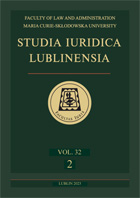The Construct of Strict Liability in Criminal Law of England and Wales in the Context of Polish Legal Regulations on the Subjective Element in the Structure of a Prohibited Act
The Construct of Strict Liability in Criminal Law of England and Wales in the Context of Polish Legal Regulations on the Subjective Element in the Structure of a Prohibited Act
Author(s): Andrzej LewnaSubject(s): Criminal Law, Comparative Law
Published by: Wydawnictwo Naukowe Uniwersytetu Marii Curie-Sklodowskiej
Keywords: strict liability; subjective side; prohibited act; individualization of liability; principle of guilt; criminal law;
Summary/Abstract: The construction of strict liability has been for years one of the most controversial concepts in the field of substantive criminal law in common law countries. While the very idea of basing the liability of an individual of a repressive nature on a regime based on strictly objective assessments seems to stand in opposition to the principles of criminal law that are fundamental to Western systems, such as the individualization of liability and the principle of guilt, at the same time, the use of the construct discussed may bring about considerable instrumental benefits, especially with regard to the protective function of criminal law. The article discusses the concept of strict criminal liability as developed in the system of England and Wales and presents the position that this concept occupies in relation to the classic for Anglo-Saxon countries, a two-element approach to the structure of a prohibited act, based on the correspondence of both objective and subjective components, and then transfers the considered problems onto the Polish criminal law plane in order to analyse the possibility of adapting an analogous construct in the statutory regulation of the subjective side of a prohibited act. In addition, the article presents the thesis that the advantages of strict liability may support the modification of the national approach towards a partial resignation from the requirements of the presence of a specific subjective element in the psyche of the perpetrator of a prohibited act in relation to all its objective features.
Journal: Studia Iuridica Lublinensia
- Issue Year: 32/2023
- Issue No: 2
- Page Range: 203-223
- Page Count: 21
- Language: English

